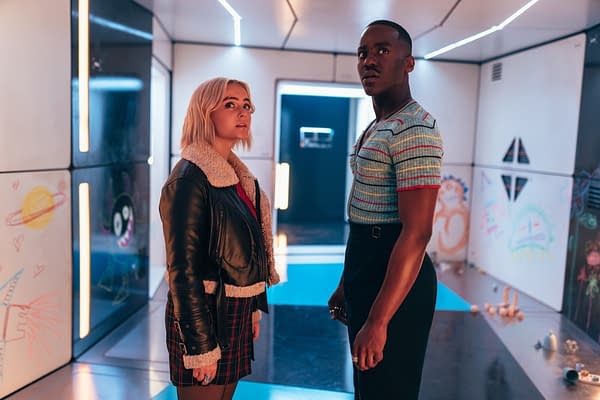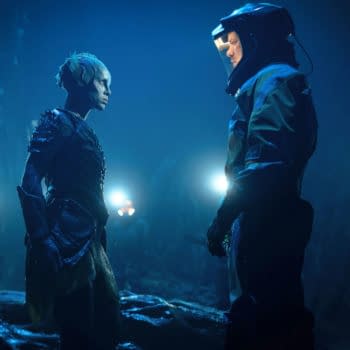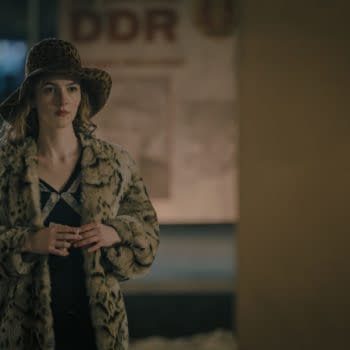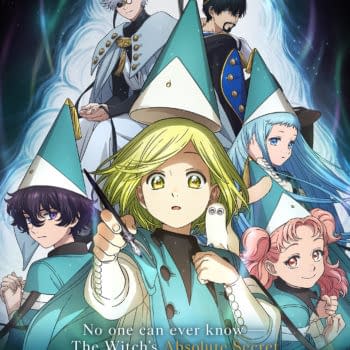Posted in: BBC, Disney+, Doctor Who, TV | Tagged: bbc, bbc iplayer, disney, doctor who, Millie Gibson, Ncuti Gatwa, russell t davies
Doctor Who: Sorry, Grumpy Adults: The Disney+ Era Is For Kids & Teens
Russell T. Davies designed the more emotional and young iteration of Doctor Who in the Disney+ era for younger generations to discover.
The dust has settled on the complete first season of the new Doctor Who is now available on Disney+ worldwide and the BBC iPlayer in the UK, and it's worth assessing the series. There has been much grumbling and gnashing of teeth amongst fans of both the classic era and the 2005 revival era, who have complained that the show isn't the same. It's more juvenile, more crass, more mawkish and emotional, but all of that is on purpose. It's a feature of the new era, not a bug. Returning Russell T. Davies designed this iteration of Doctor Who for kids and teenagers, and adults – those older than their teens – can come along for the ride if they like.

Doctor Who – Designed for Gen Z
Davies was asked by the BBC to return as showrunner for Doctor Who and usher the series into the streaming era. He had been thinking about it for a long time after assessing the current state of television. Younger viewers are mostly streaming now, and few series on British television get the high figures normally considered a hit. British dramas also need international co-production partners to get the budgets they need. Davies didn't want to just repeat the common tropes of the series with fan fiction to pander to fans. He knew that for Doctor Who to survive, it had to evolve and be updated to appeal to new fans, that is, children, teenagers, and Gen Z.
Davies has said he spoke to a lot of kids and young people and found that they were now dealing with a lot of mental health issues and wanted to make Doctor Who not only brighter and hopeful but also offer address a way to express emotions. That's how Ncuti Gatwa's Doctor is the youngest (even though Matt Smith was younger than Gatwa when he was first cast as the Tenth Doctor, but played him as an old man in a young man's body) most emotional with his heart on his sleeve, given to an outpouring of rage and grief more than any previous Doctor. Millie Gibson as Ruby is also a reconfigured companion archetype from Billie Piper's Rose Tyler from 2005. She's a Gen Z companion with an emotional arc about finding her identity and representing the children in Britain who grew up and were supported in foster care.
Continuing a 61-Year Tradition of Kids Discovering Their Doctor
Davies wanted a Doctor Who series that children and teens could discover fresh for the first time because that's always been how the series worked for kids. To survive as a series, Doctor Who must evolve so that every era has a Doctor and companion that the kids of that generation can claim as their own. It's not only about bringing joy to kids but also ensuring the series continues to survive rather than get cancelled. Older fans can watch the new version of the show and grumble it's not the one they/we loved or grew up with. That's because it's the kids' now. Davies and the BBC know that Gen Z's viewing habits are different from the live broadcast era of the classic series or the 2005 revival, that they mostly watch on streaming now, and any TV series has to compete with what the kids are watching on TikTok, YouTube, Instagram and Twitch.
Doctor Who now has to be faster, frenetic, dynamic, and more fannish to keep the kids watching and not switch off or take their eyes off the screen to look at their phones. According to Davies, his and the BBC's main priority is to ensure Doctor Who is the top series amongst kids and Gen Z on the Player, and that appears to be a success. It's incorrect to assume just because the ratings from live broadcasts are the most important factor in a TV series' success now, though high figures would certainly contribute. It's really about the streaming figures, and the fact that a series like Doctor Who is going to be indefinitely available for streaming is about the long game, having the entire series always available and ripe for discovery through word of mouth. Disney+ has not revealed the global viewing figures for the series, but the series is on-brand for its target audience of kids, young female viewers, and families. For older viewers and especially grumpy old men, the series is no longer for them if they can't enjoy it. It's for the kids, as it was always intended.














